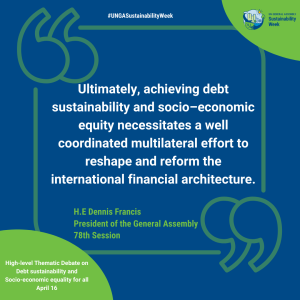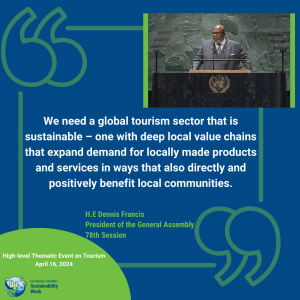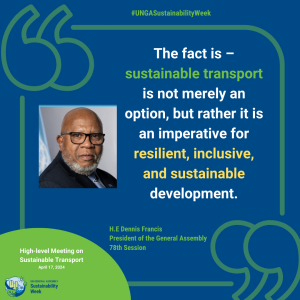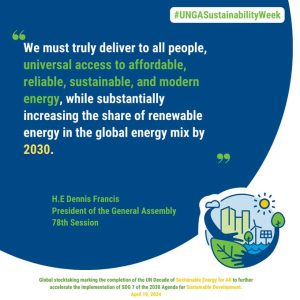UN GENERAL ASSEMBLY
SUSTAINABILITY WEEK
15-19 April 2024
#UNGASustainabilityWeek
Paving the way for a sustainable future
As we passed the critical milestone of the mid-point in the implementation of the 2030 Agenda for Sustainable Development, impactful transformation remains central to the ongoing efforts to advance all three dimensions of sustainable development – social, economic, and environmental – to achieve peace, prosperity, progress, and sustainability for all. Among others, COVID-19, conflicts, geopolitical tensions, and humanitarian crises in various parts of the world have posed severe challenges to these efforts and derailed implementation of the SDGs by 2030. Building on the momentum gained from the September 2023 SDG Summit is important in effectively tackling the triple planetary crises of climate change, biodiversity loss and pollution.
Now, as we set our attention on the Summit of the Future in September 2024, sustainability is more than ever key for critical sectors of the economy to meaningfully contribute to a prosperous future for present and future generations. The foundation of the future of commerce must be marked by environmental responsibility. We must promote sustainable production and consumption in every facet of human existence. Economic prosperity is intertwined with sustainability. Sustainable business models must, therefore, be promoted in all economic activities.
Sustainability also means ensuring that the benefits of progress are shared equitably, leaving no one behind. The debt crisis – a development crisis – has further exacerbated the socio-economic disparities in the world. Therefore, addressing debt sustainability as an avenue to improve socio-economic equality should be central to the focus on building a sustainable future. Sustainable transportation, infrastructure, tourism, and energy as well as debt sustainability are all critical avenues to attaining such a future.
In this regard, the President of the General Assembly for its seventy-eighth session, H.E. Mr. Dennis Francis, will convene the following meetings as part of the first-ever Sustainability Week, at United Nations Headquarters in New York:

Web Broadcast Link- April 15
High-level thematic debate on debt sustainability and socio-economic equality for all
15 April 2024, 3:00p.m.
General Assembly Hall, UN Headquarters, New York
Objective
This high-level thematic debate aims to take stock of the gaps and bottlenecks in achieving debt sustainability and the implications for the most vulnerable, particularly in developing countries. It also aims to identify key local, national, and international solutions through enhanced partnerships and ambitious initiatives that strive to achieve socio-economic equality for all.
Format
The high-level thematic debate will comprise an opening segment, a fireside chat, a high-level plenary, and a closing segment. The meeting will be open to Member States and Observers, the United Nations system, ECOSOC-accredited non-governmental organizations, and other relevant stakeholders.
Concept note
Focal point
For further information please contact Ms. Vanessa Vandijsseldonk, Senior Adviser on Sustainable Development and Financing for Development, at the Office of the President of the General Assembly. – vanessa.vandijsseldonk@un.org
PGA Remarks: Debt Sustainability and Social Equity for All

Web Broadcast Link- April 16
Part 1
Web Broadcast Link- April 16
Part 2
High-level thematic event on Tourism
16 April 2024, 10:00 am to 1:00 pm and 3:00 pm to 6:00 pm
General Assembly Hall, UN Headquarters, New York
Objective
The high-level thematic event on tourism aims to advance a concerted approach on strengthening tourism resilience at the highest level and maximising its contribution to the sustainability agenda. The event offers Member States, Observers, civil society, UN System and other stakeholders a platform to discuss strategies, share best practices and experiences to promote sustainable and resilient tourism and its contribution to achieving SDGs.
Format
The event will comprise an opening, a fireside chat, two high-level plenary segments, two thematic debates and a closing segment. The meeting will be open to the United Nations system, ECOSOC-accredited non-governmental organizations and other relevant stakeholders.
Fireside Chat: The Future of Tourism
The successive natural and man-made crises have improved the awareness and development impact of the tourism sector. At the same time, they have revealed its vulnerability to external shocks and the consequences thereof on economies, societies and our planet while underscoring structural challenges that need to be addressed if we want to boost the resilience of the sector and maximize its contribution to a more inclusive and sustainable future.
New business models and effective partnerships are emerging, calling for appropriate mechanisms to encourage more holistic policies as well as multistakeholder engagement and partnerships. The Fireside Chat will provide opportunities to involve non-state actors, private sector, academia and civil society to discuss how we can harmonize leadership in and of the tourism sector in order to ensure a prosperous and sustainable future.
Thematic debate 1 –Launch of the Statistical Framework for Measuring the Sustainability of Tourism
The Statistical Framework for Measuring Sustainability of Tourism was adopted at the 55th Session of the United Nations Statistical Commission held in February 2024. A living example of moving beyond GDP to value what counts, the SF-MST, the sustainability indicators, respond to the information needs of more integrated tourism policy.
The key statistical data and indicators will be measured for three dimensions: economy, society, and environment. In addition, the data and indicators will be measured on a global, national, and sub-national levels. The SF-MST is to provide for a multipurpose conceptual statistical framework, which measures the impacts and dependencies of sustainable tourism.
Pilot studies of the SF-MST have been carried out in over 20 countries and has helped to further strengthen the Framework as well as helped destination managers and policymakers in the countries to develop strategies to enhance sustainable tourism in their respective countries. In the implementation of the SF-MST, there will be more robust data to ensure that sustainable tourism action on the ground really contributes to raising living standards and ensuring that no one is left behind.
Thematic debate 1 aims to launch the framework and provide a platform and give member states the opportunity to discuss the importance of such tools for sustainability in tourism. A commonly agreed evidence-based tool helps to engage with stakeholders across the board to jointly agree on where we stand, where we need to go, and how to get there. Harmonized and trusted data is critical to communicate progress more effectively, benchmark performance, align policy agendas and governance models, and promote innovative business practices and partnerships.
Thematic debate 2 – Fostering Resilient Tourism to facilitate and ensure global sustainability
As the largest industry globally, tourism, makes a substantial contribution to sustainable development. Nevertheless, tourism is intrinsically susceptible to several disruptive occurrences such as climate change, pandemics, cyber-security incidents, terrorism, and political instability and conflict. Therefore, it is crucial to safeguard the worldwide tourism industry by ensuring the resilience of the global tourism ecosystem, including the capacity of tourist destinations to endure shocks, promptly recover from crises, or even prosper in the face of such difficulties. Developing resilience entails the process of planning, managing, and recovering from adversities. The corona disease (COVID-19) pandemic represents yet another episode in a series of global disruptions that has heightened the attention of global stakeholders to the inherent vulnerability of the tourism sector.
Concurrently, it has underscored the sector’s remarkable capacity for rapid recovery and its potential to catalyse economic resurgence with even greater alacrity. It is imperative to investigate methodologies for fostering resilience within the global tourism sector, thereby facilitating and ensuring global sustainability.
During thematic debate 2 Member States will discuss potential strategies for building resilience in the tourism sector including the sector’s ability to withstand and recover from various crises. The discussion will also focus on addressing vulnerabilities and risks, funding and investing in resilience and resilience-building frameworks and partnerships.
Concept note
Focal point
For further information please contact Ms. Vanessa Vandijsseldonk, Senior Adviser on Sustainable Development and Financing for Development, at the Office of the President of the General Assembly. – vanessa.vandijsseldonk@un.org
PGA Remarks: Sustainable Tourism

Web Broadcast Link- April 17
High-level meeting on Sustainable Transport
17 April 2024, 10:00a.m.
General Assembly Hall, UN Headquarters, New York
Objective
The high-level meeting will highlight sustainable and effective solutions to improve the balance between economic, social, and environmental dimensions of sustainable transport, to take full advantage of sustainable transport in accelerating the implementation of the 2030 Agenda for Sustainable Development.
Format
The high-level meeting will consist of an opening, a ministerial segment, an interactive multi-stakeholder panel, and a closing segment. The meeting will be open to Member States and Observers, the United Nations system, ECOSOC-accredited non-governmental organizations and other relevant stakeholders.
Multi-stakeholder Panel: Enhancing intermodal transport connectivity and developing socially inclusive and environmentally friendly transportation.
The panel will discuss intermodal transport policy-design and best-practice to improve passenger journeys and freight movements. The speakers will address how transport infrastructure and services can be made more broadly available, accessible, inclusive and safe, in an environmental manner. It will also discuss the role of international cooperation in promoting sustainable transport systems among countries. Guiding questions:
- How can efficient multimodal and intermodal transport solutions be used to improve passenger journeys and freight movements? Where do opportunities lie in boosting modal shift to more efficient, sustainable, and green solutions?
- What can be done to ensure that transport infrastructure and services are beneficial to all, including older persons, persons with disabilities, women, and rural communities?
- How can sustainable transport policies be integrated into climate change mitigation and adaptation actions? What new innovations and emerging technological solutions can help achieve socially inclusive and environmentally friendly sustainable transport?
- What is the role of local, regional, and national governments in enhancing sustainable transport, and how can they be empowered to act as agents of change?
- How can international cooperation be harnessed to develop transport and transit corridors? What role can the United Nations and stakeholders, including the private sector, play to support the development of sustainable transport opportunities?
Concept note
Focal point
For further information please contact Mr. Jun Jiang, Adviser on Sustainable Development and Financing for Development, at the Office of the President of the General Assembly – jun.jiang1@un.org
PGA Remarks: Sustainable Transport

Web Broadcast Link- April 18
Part 1
Web Broadcast Link- April 18
Part 2
Informal dialogue on Building global resilience and promoting sustainable development through infrastructure connectivity
18 April 2024, 10:00 am to 1:00 pm and 3:00 pm to 6:00 pm
General Assembly Hall, UN Headquarters, New York
Objective
The informal dialogue aims to generate momentum and raise ambition on proposals to contribute to enhancing investments in quality, reliable, sustainable, and resilient infrastructure, including a risk-informed approach to infrastructure development and management. It also aims to create a platform to share best practices and strategies to enhance collaboration and partnerships within and between regions and regional and interregional challenges faced and to engage on means of implementation including innovative financing mechanisms and partnerships to support improved connectivity, resiliency, and quality of infrastructure systems.
Format
The dialogue will consist of an opening, plenary segment and two multistakeholder panels. The dialogue will be open to Member States, Observers, United Nations system, ECOSOC-accredited non-governmental organizations, and other relevant stakeholders.
Plenary
The plenary segment will highlight Member States’ perspectives on building global resilience and promoting sustainable development through infrastructure connectivity including the critical factors that have facilitated advancements in infrastructure connectivity, as well as primary challenges being faced. To this end, participants are encouraged to highlight new commitments, pledges or declarations in infrastructure connectivity and progress in existing initiatives.
Multistakeholder Panel 1 – Bridging the Gap: Challenges and Best Practices to Forge a Resilient Future through Infrastructure Connectivity.
This panel will discuss the bottlenecks in achieving infrastructure connectivity and explore best practices in infrastructure connectivity. It will highlight region-specific challenges and the critical enablers that result in impactful, resilient, and sustainable infrastructure initiatives. The discussion will explore measures and policies essential for ensuring inclusive and sustainable access to infrastructure for all, aligning with principles of social and environmental responsibility and the reduction of inequalities, and the role of international cooperation in ensuring that the development of resilient infrastructure aligns with broader sustainability and resilience goals while improving regional and interregional connectivity.
Guiding Questions:
- What lessons can be learned from integrated approaches to environmental sustainability, resilience, and connectivity? What good practices can be shared on involving regional and local governments in the planning and implementation of infrastructure projects?
- How can the international community better collaborate to promote the exchange of best practices and overcome the challenges in infrastructure connectivity, across regions and in countries most vulnerable to climate change and economic challenges?
- How does infrastructure connectivity influence economic recovery, job creation, and addressing inequalities, especially in the context of the interconnected crises of climate change, biodiversity loss, pollution, and desertification?
- What measures and policies are needed to ensure affordable and equitable access to infrastructure for all, considering the principles of inclusivity as well as economic, social and environmental sustainability?
Multistakeholder Panel 2 – Achieving Infrastructure Resilience through partnership, solidarity, and innovation.
The panel 2 will explore the means of implementation to support investment in resilient infrastructure including innovative finance mechanisms options, public-private partnerships, and blended finance models. It will delve into the collaboration between international financial institutions and the private sector to scale up investments in resilient infrastructure projects, with a focus on groups of countries facing unique challenges. The panel aims to identify the systems and mechanisms to support various phases of infrastructure connectivity and examine the role of international cooperation in addressing challenges and vulnerabilities in global supply chains within the context of infrastructure connectivity.
Guiding Questions:
- What strategies can be implemented to bridge the infrastructure investment gap and ensure sustainable and resilient development?
- What innovative financing mechanisms, such as blended finance models, have shown promising results in mobilizing resources for sustainable infrastructure development?
- In what ways can international financial institutions, development partners and private sector actors collaborate to scale up investments in resilient infrastructure projects, particularly in regions facing unique challenges, such as LDCs, LLDCs and SIDS?
- What role can international cooperation play in facilitating investment while addressing the challenges and vulnerabilities in global supply chains, particularly in the context of infrastructure connectivity?
Concept note
Focal point
For further information please contact Ms. Sneha Dubey, Senior Adviser on Sustainable Development and Financing for Development, at the Office of the President of the General Assembly. – sneha.dubey@un.org
PGA Remarks: Infrastructure Connectivity

Web Broadcast Link- April 19
Part 1
Web Broadcast Link- April 19
Part 2
Global stocktaking marking the completion of the UN Decade of Sustainable Energy for All to further accelerate the implementation of SDG 7 of the 2030 Agenda for Sustainable Development.
19 April 2024, 10:00 am to 1:00 pm and 3:00 pm to 6:00 pm
General Assembly Hall, UN Headquarters, New York
Objective
The goal of the global stocktaking is to review progress achieved at the end of the UN Decade of Sustainable Energy for All, 2014-2024, and to raise ambition and accelerate action towards attaining SDG 7 by catalysing innovative solutions, investments and multi-stakeholder partnerships.
In this context, key questions to be addressed include:
- How can ambitions be further increased and implementation be further accelerated?
- How can multi-stakeholder partnerships be scaled up?
- What will be the appropriate institutional arrangements for continuing to advance international cooperation on energy beyond the UN Decade of Sustainable Energy for All?
Further voluntary commitments, including Energy Compacts, will be encouraged in support of closing the energy gap, rapidly transitioning to decarbonized energy systems, addressing energy’s interlinkages, and strengthening partnerships and the means of implementation.
Format
The global stocktaking will consist of an opening and closing segments and two thematic debates. The global stocktaking will bring together high-level representatives from Member States and other leaders from all regions. The meeting will be open to the United Nations system, ECOSOC-accredited non-governmental organizations, and other relevant stakeholders.
Thematic Debate 1: Closing the energy access gap and transitioning to decarbonized energy systems
675 million people still lack access to electricity. About 2.3 billion people remain without clean cooking solutions, causing millions of premature deaths annually, disproportionally affecting women. Progress towards ensuring universal access to electricity and clean cooking solutions and technology by 2030 will be reviewed and solutions to closing the remaining energy access gap will be discussed.
While the investment in renewables is outpacing the investment in fossil fuel power plants, much more is required to transition away from fossil fuels as the deployment of renewables is lagging especially in transport, industry, heating and cooling. Discussions will centre on the need for accelerated progress on deep energy decarbonization in support of achieving the 1.5°C goal of the Paris Agreement, including through the tripling of renewable energy capacity globally and the doubling the global average annual rate of energy efficiency improvements by 2030, as well as the phase out inefficient fossil fuel subsidies that do not address energy poverty or just transitions.
Thematic Debate 2: Addressing energy’s interlinkages and strengthening means of implementation and partnerships
Progress on SDG7 can produce particularly high co-benefits in other areas of sustainable development, bringing many more development synergies than trade-offs for vulnerable populations. This includes poverty eradication, food security, health, education, prosperity, gender equality, jobs, transport, ocean, water and sanitation, and the empowerment of women and youth. However, co-benefits in these areas do not come about automatically. Discussions will elaborate on cross-sectoral approaches that are required at the level of policy, planning, and implementation. Among other benefits, the implementation of SDG7 could result in millions of new green jobs world-wide.
The need to dramatically scale up international cooperation to catalyse public and private finance and investment to accelerate energy transitions, especially for developing countries as well as vulnerable countries and countries in special situations, including SIDS, LDCs and LLDCs, will be focused on. Discussions will also consider the importance of infrastructure, technology transfer, capacity building and the collection, management and application of data in addressing the digital divide in the energy sector.
Concept note
Focal point
For further information please contact Bramantya Widodo, Adviser on Sustainable Development and Financing for Development, at the Office of the President of the General Assembly – bramantya.widodo@un.org
President General Assembly's Call to Action
Participation
All Member States and Observers are invited to participate at the highest level possible.
Civil society and non-governmental organisations, in consultative status with ECOSOC, are invited to register their interest to participate.
The registration portal for ECOSOC-accredited NGOs to participate in the Sustainability Week is now open.
Key Features
#ChooseSustainability Campaign
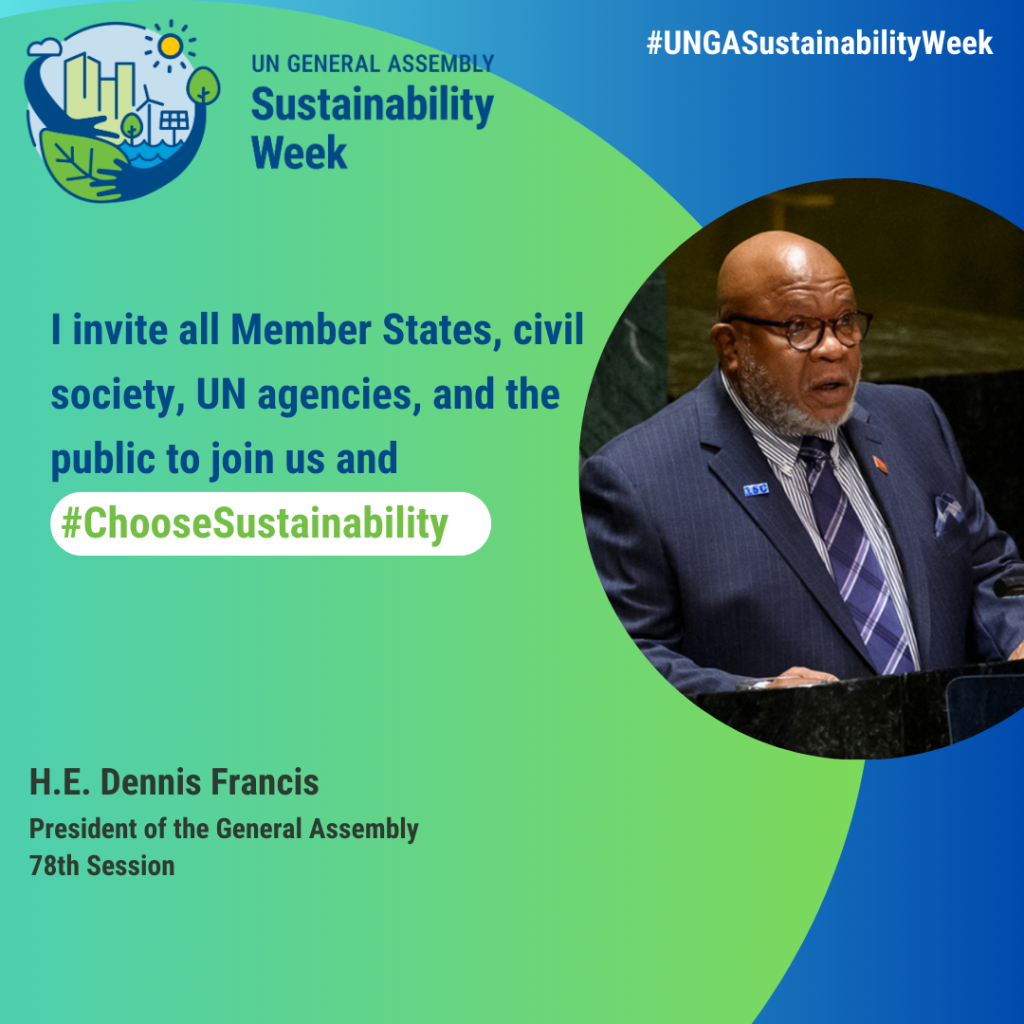
As part of Sustainability Week, the PGA will call on Member States, civil society, UN agencies, and the public to ‘Choose Sustainability’. This will include pledging to adopt sustainable habits and actions, individually or as an organization.
The core element of the campaign will be focused on Permanent Missions to the UN, civil society, UN agencies, and public and will be primarily driven by social media posts.
To kick off the campaign, an official letter will be sent to all Missions with details on the campaign, links to resources and key contacts, and a list of potential actions/habits to adopt – as per the UN’s Act Now resource and, where possible, in line with the sectors of Sustainability Week.
During his interactions with Permanent Representatives and other officials, the PGA will call on support to ‘choose sustainability’. A pin has been developed and will be shared with PRs and key officials.
For further details, Mr. Carl Mercer, Team Leader on Communications, Media, Advocacy & Speechwriting can be contacted by e-mail: carl.mercer@un.org.
#AskPGA: A conversation with the Youth.
#AskPGA: A conversation with the Youth.
Wednesday, 17 April at 1:15 p.m.
ECOSOC Chamber, United Nations Headquarters
ASKPGA-A-CONVERSATION-WITH-YOUTH-flyer
Communications and Media
Focal point for communications and campaign: Mr. Carl Mercer, Team Leader on Communications, Media, Advocacy & Speechwriting carl.mercer@un.org
Focal point for Media: Ms. Carolina Nazzaro, Media Adviser carolina.nazzaro@un.org
Press Releases
Trello
Images for Thematic Events during Sustainability Week

